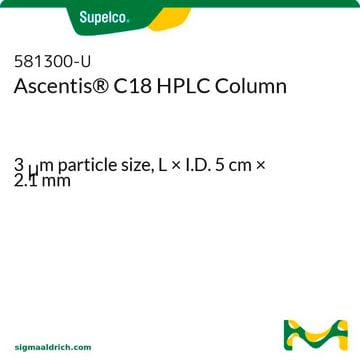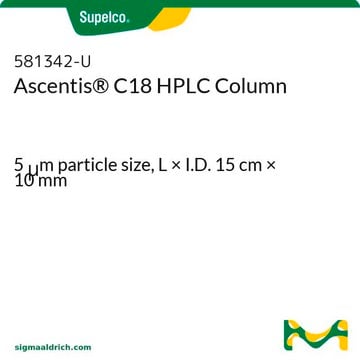581324-U
Ascentis® C18 (5 µm) HPLC Columns
L × I.D. 15 cm × 4.6 mm, HPLC Column
Synonym(s):
Ascentis RP18 HPLC Column
About This Item
Recommended Products
product name
Ascentis® C18 HPLC Column, 5 μm particle size, L × I.D. 15 cm × 4.6 mm
material
stainless steel column
Quality Level
Agency
suitable for USP L1 (Similar to Phenomenex Luna C18)
product line
Ascentis®
feature
endcapped
manufacturer/tradename
Ascentis®
packaging
1 ea of
extent of labeling
25% Carbon loading
parameter
≤70 °C temp. range
400 bar pressure (5801 psi)
technique(s)
HPLC: suitable
LC/MS: suitable
L × I.D.
15 cm × 4.6 mm
surface area
450 m2/g
surface coverage
3.7 μmol/m2
impurities
<5 ppm metals
matrix
fully porous particle
silica gel high purity, spherical
matrix active group
C18 (octadecyl) phase
particle size
5 μm
pore size
100 Å
operating pH range
2-8
application(s)
food and beverages
separation technique
reversed phase
Looking for similar products? Visit Product Comparison Guide
Related Categories
General description
Ascentis C18 is an extremely stable and reliable first choice HPLC column that gives symmetric peak shape and excellent retention even for difficult compounds.
Application
- Preparation of polar embedded C18 stationary phase for efficient separation of peptides and proteins in high performance liquid chromatography.: This study details the development of a polar embedded C18 stationary phase, demonstrating its effectiveness in separating peptides and proteins. The Ascentis® C18 HPLC Column was utilized for its high separation efficiency, crucial for proteomics and biopharmaceutical applications (Ali et al., 2022).
- A dilute-and-shoot liquid chromatography-tandem mass spectrometry method for urinary 18-hydroxycortisol quantification and its application in establishing reference intervals.: Researchers used the Ascentis® C18 HPLC Column to develop a sensitive method for quantifying urinary 18-hydroxycortisol. This method aids in clinical diagnostics and endocrinological studies by providing accurate reference intervals (Zhao et al., 2022).
- A Comparative Study on Analysis of Ginsenosides in American Ginseng Root Residue by HPLC-DAD-ESI-MS and UPLC-HRMS-MS/MS.: This comparative analysis utilized the Ascentis® C18 HPLC Column to separate and identify ginsenosides in American ginseng. The study highlights the column′s application in natural product research and quality control in the pharmaceutical industry (Hsu et al., 2022).
- Validation of a Rapid and Easy-to-Apply Method to Simultaneously Quantify Co-Loaded Dexamethasone and Melatonin PLGA Microspheres by HPLC-UV: Encapsulation Efficiency and In Vitro Release.: This research validates an HPLC method using the Ascentis® C18 Column to simultaneously quantify dexamethasone and melatonin in PLGA microspheres, offering a robust tool for drug delivery studies (Brugnera et al., 2022).
- Simultaneous determination of ivermectin, clorsulon and their related substances in an injectable finished product by a stability-indicating RP-HPLC method.: The Ascentis® C18 HPLC Column was employed to develop a stability-indicating method for analyzing ivermectin and clorsulon in pharmaceutical formulations, emphasizing its role in quality control and regulatory compliance (Padivitage et al., 2022).
Features and Benefits
- Excellent retention
- Symmetric peak shape
- High reproducibility
- Complete LC-MS compatibility
Legal Information
Application
guard cartridge
related product
Storage Class Code
11 - Combustible Solids
WGK
WGK 3
Flash Point(F)
Not applicable
Flash Point(C)
Not applicable
Choose from one of the most recent versions:
Already Own This Product?
Find documentation for the products that you have recently purchased in the Document Library.
Customers Also Viewed
Articles
Phosphonates analysis challenges due to their polar nature and lack of UV active chromophores in antiviral drugs.
Phosphonates analysis challenges due to their polar nature and lack of UV active chromophores in antiviral drugs.
Phosphonates analysis challenges due to their polar nature and lack of UV active chromophores in antiviral drugs.
Phosphonates analysis challenges due to their polar nature and lack of UV active chromophores in antiviral drugs.
Protocols
Reversed-phase HPLC sometimes requires ion pairing for adequate retention of polar compounds due to hydrophobic interactions.
Reversed-phase HPLC sometimes requires ion pairing for adequate retention of polar compounds due to hydrophobic interactions.
Reversed-phase HPLC sometimes requires ion pairing for adequate retention of polar compounds due to hydrophobic interactions.
Reversed-phase HPLC sometimes requires ion pairing for adequate retention of polar compounds due to hydrophobic interactions.
Chromatograms
application for HPLCapplication for HPLCapplication for HPLCapplication for HPLCOur team of scientists has experience in all areas of research including Life Science, Material Science, Chemical Synthesis, Chromatography, Analytical and many others.
Contact Technical Service










